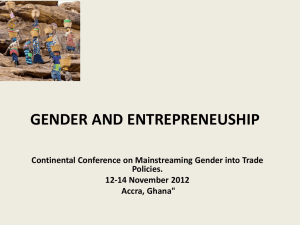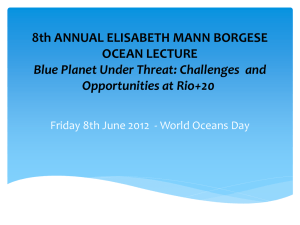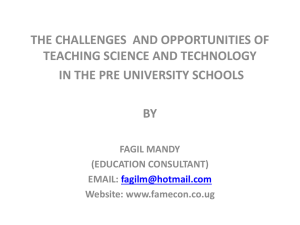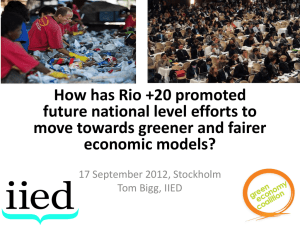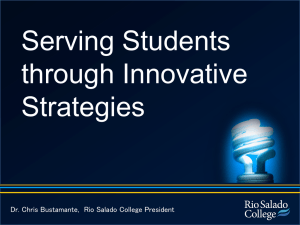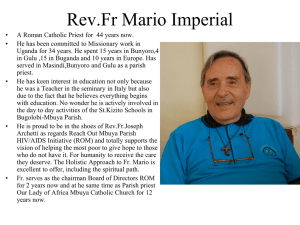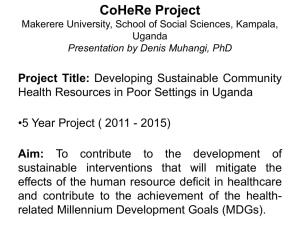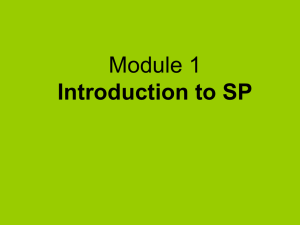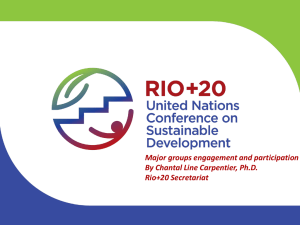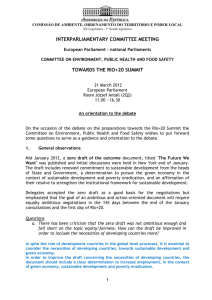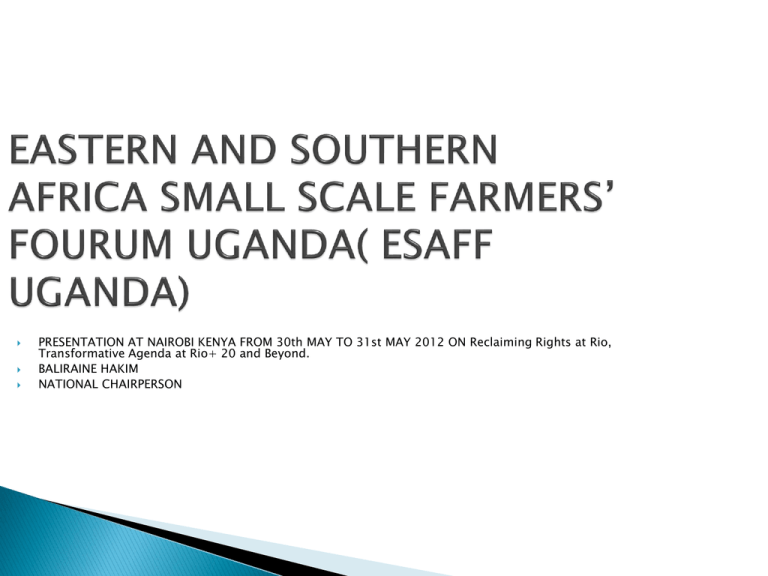
PRESENTATION AT NAIROBI KENYA FROM 30th MAY TO 31st MAY 2012 ON Reclaiming Rights at Rio,
Transformative Agenda at Rio+ 20 and Beyond.
BALIRAINE HAKIM
NATIONAL CHAIRPERSON
ESAFF Uganda is therefore a small scale farmer-led movement formed to facilitate
processes through which smallholder farmers’ development concerns can be
solicited, articulated and ultimately addressed through local national policies and
programs.
The vision of ESAFF Uganda is “Empowered Small Scale Farmers with
Improved and Sustainable Livelihoods”
The Mission is “To nurture and promote participation of SSF in creating an
environment that is responsive to their needs and concerns”
The Government of Uganda presented its position paper on Rio + 20
dated 31st October 2011 and amongst the issues they welcomed the
decision of the UN General Assembly Resolution No. 64/236 to United
Nations Conference on Sustainable Development ( Rio + 20) to focus on
the Green Economy in the context Sustainable Development, Poverty
Eradication, and Institutional frame worker for Sustainable Development
The detailed position paper for Uganda is as follows.
And after having analyzing this position paper the SCOs came up with the
following remarks and some recommendations.
_ Recognizing the past track record of a large implementation gap of
sustainable development commitments in Uganda as a result of lack of an
explicit strategy or framework on Sustainable
Development,
_ Further recognizing the skewed concentration of wealth and social inequality,
unemployment, rampant violation of rights, extreme weather and climate
scenarios, hunger and malnutrition, natural resources loss, water, land and air
pollution, water scarcity, and the commoditization of all aspects of nature,
_ Noting with concern that the National report on Progress on the
Implementation of the RIO
Commitments on Sustainable Development in Uganda does not portray the
actual challenging situation on the ground,
_ Reiterating the call to secure renewed political commitment for Sustainable
Development,
We recommend that:
The Government of Uganda
1. Develops a pragmatic framework/strategy for Sustainable Development
with benchmarks on the basis of which progress will be measured in future,
2. Develops clear and agreed upon guidelines to formalize and legitimize the
engagement of civil society and other stakeholders as stipulated in Principle
27of the RIO principles which states that people shall
cooperate in
good faith and in a spirit of partnership in the fulfillment of the principles
embodied in the RIO Declaration and in the further development of
international law in the field of sustainable development,
3. Develops a review framework and benchmarks to measure performance
against internationally agreed commitments relating to Sustainable
Development,
4. Strengthens the population Regulation Framework by including sex
education and reproductive health among the youth so as to counteract the
high population growth rate,
5. Develops a comprehensive indicator for future budget allocations based on
sector work plans cognizant of clear procurement plans and actual cash flows
at national level with a predictable and reliable systematic fiscal
decentralization framework
6. Revises Sector Investment Plans to allow for allocation of funds to programs
that foster sustainable development and inclusive growth and prosperity,
7. Carries out Policy Audits through a thematic assessment of sectors
reflecting the impacts of the established policies, laws and institutions so as to
provide linkages to livelihoods that translate into tangible actions for local
people,
8. Domesticates the internationally agreed conventions/protocols/agreements
into national legislation and implements them,
9. Amends the existing Access to Information Act so as to ensure the right to
access to information for all.
10. Adopts an adaptive planning system that takes care of new and emerging
challenges to Sustainable
Development with a focus on green economy,
11. Establishes a registry documenting principles and practices of indigenous
knowledge given that this is a cornerstone to Sustainable Development.
12. Puts in place a framework to address the intricate relationship of
indigenous people with nature in context of Sustainable Development,
13. Establishes knowledge management systems to enable continued
monitoring, storage and
dissemination including investment in infrastructure, human resource
and strengthening institutions
for knowledge management on all aspects of Sustainable Development,
14. Uses a Rights Based Approach that recognizes the needs and
contributions of special categories of
people; the Children and Youth, Women and Indigenous Peoples and their
communities in the
context of Sustainable Development,
15. Puts in place a framework to provide reliable and decent green jobs for
every one most especially
the Youth and ensure that Labor laws are harmonized so as to equitably
address workers’ rights.
16. Implements the Marrakech 10-Year Framework of Programs on
Sustainable Consumption and
Production and strengthens the Uganda Cleaner Production Center as a
center of excellence for best
practices on aspects of green economy, while promoting other sectors in
context of a green economy
RIO+20 Conference;
17. Puts in place a global framework to ensure access to clean and
renewable energy for all be a driving
approach to realizing a green economy and further call on development
partners and the
international community to initiate energy access initiatives following
the principles of affordability,
equity and environmental sustainability of an energy mix,
18. Stems up accountability and strengthen existing national frameworks
addressing corruption,
19. Ensures that the principal of the green economy be mainstreamed into
development frameworks
while ensuring that developing countries maintain the policy space to
pursue their right to
development,
20. Ensures that mainstreaming the concept of the green economy in
development frameworks MUST
respect entirely the principles agreed upon at the 1992 United Nations
Conference on Environment
and Development (UNCED) and, particularly, the principle of common but
differentiated
responsibilities,
21. Ensures that the green economy MUST guarantee access to markets for
developing countries’ goods
and services so as to achieve their right to development and that it does not
serve as a barrier to
trade,
22. Ensure that an implementation mechanism with committed funding and
technology transfer
frameworks are put in place with poverty eradication top on the agenda,
23. Ensures that United Nations Environment Program (UNEP) is transformed
into a specialized
International institution for environment.
We re-affirm the decision of the General Assembly calling for efficient and
effective preparations at
the local, national, regional and international levels by Governments and the
United Nations system
and active participation of all major groups at all stages of the preparatory
process



